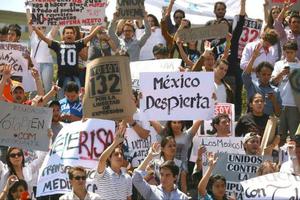Peter Watt: Twenty years after the North American Free Trade Agreement (NAFTA) came into effect, the administration of Mexican president Enrique Peña Nieto is accelerating a deeply unpopular process of neoliberal reform. To what extent does the return of the Institutional Revolutionary Party (PRI) in Mexico represent a cross-party and cross-border strategy of political and economic integration and how do you view the recent resurgence of the PRI?
John Ackerman: The remarkable thing about the transfer of power from the National Action Party (PAN) to the PRI in 2012 is the lack of any kind of real change in drug war policy. It shouldn't be a surprise because we haven't really had a regime change or even a democratic transition in Mexico. When the PAN took power in 2000 it was very much a continuation of the neoliberal PRI policies of the 1980s and 1990s.
At the level of PR and public speeches, Peña Nieto claimed he was going to bring about a radical change in policy. In many ways his discourse used the same terms as the critics of ex-president Felipe Calderón's drug war.
Many in the No Más Sangre (No More Blood) movement, which argued against the disastrous military strategy, emphasized that public security policy should focus on the Mexican people, on peace, and harm reduction and that it should not be an extension of the U.S. border patrol nor should it represent U.S. business interests.
Mexican sovereignty should be about the welfare of the people and law enforcement should work to that end. Linked to this is the whole issue of militarization. Felipe Calderón rolled the military out to the streets at the very beginning of his presidency with the Operativo Conjunto Michoacán (Operation Michoacán), which is ironic given what's happening there today.
When Peña Nieto comes in, he supposedly responds to critiques about crime and violations of human rights. The problem is that it is just pure window dressing. Politics have been exactly the same—he has not taken the military off the streets, but has increased the military presence. He has not reduced collaboration with the U.S. government, but increased it. There’s nothing new, for example, about drones flying over Mexican airspace without congressional approval. What is different about this administration is that it does what Calderón did but more blatantly, challenging the traditional—but also progressive—way of thinking about sovereignty and national development in Mexico.
PW: What do you think the rationale is behind U.S. support for the current catastrophe?
JA: Mexico is already an occupied country in some ways. We are invaded and infiltrated by the U.S. intelligence and military apparatus. U.S. drug agents and military are armed in Mexican territory (which is illegal). They have intelligence centers all over the country and they fly drones. Mexico is fully integrated into the North American military strategy with the full compliance of Mexican officials. The capture of El Chapo Guzmán was a joint operation, if not a U.S. operation with Mexican help. And the 100,000 dead and the 24,000 disappeared are the direct result of policy. This is not something that just happens, even in a country with drugs....

